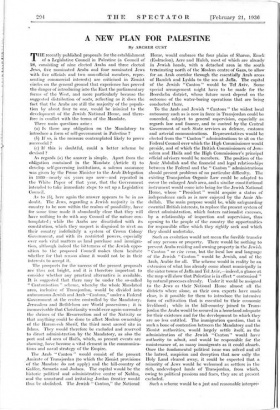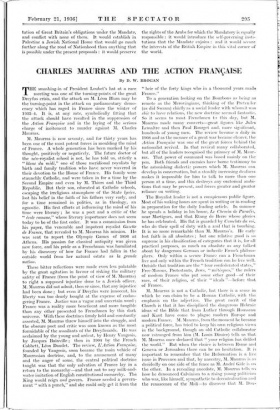A NEW PLAN FOR PALESTINE
By ARCHER OUST
Three main questions arise : (a) Is there any obligation on the Mandatory to introduce a form of self-government in Palestine ?
(b) If so, is the measure contemplated likely to prove successful ?
(c) If this is doubtful, could a better scheme be devised ?
As regards (a) the answer is simple. Apart from the obligation contained in the Mandate (Article 2) to develop self-governing institutions, a solemn assurance was given by the Prime Minister to the Arab Delegation in 1930—nearly six years ago now—and repeated in the White Paper of that year, that the Government intended to take immediate steps to set up a Legislative Council.
As to (b), here again the answer appears to be in no doubt. The Jews, regarding a Jewish majority in the country to be now within the realms of possibility, have for some time made it abundantly clear that they will have nothing to do with any Council of the nature con- templated ; while the Arabs are dissatisfied with its constitution, which they suspect is disguised to rivet on their country indefinitely a system of Crown Colony Government, and with its restricted powers, especially over such vital matters as land purchase and immigra- tion, although indeed the bitterness of the Jewish oppo- sition to the proposed Council makes them hesitate whether for that reason alone it would not be in their interests to accept it.
The prospects for the success of the present proposals are thus not bright, and it is therefore important to consider whether any practical alternative is available. It is suggested that there may be under the so-called " Cantonisation " scheme, whereby the whole Mandated area, inclusive of Transjordan, would be divided into autonomous Jewish and Arab " Cantons," under a Federal Government at the centre controlled by the Mandatory. Jerusalem and Bethlehem arc World possessions ; it is inconceivable that Christianity would ever again surrender the shrines of the Resurrection and of the Nativity or that anything could be done to affect Moslem ownership of the Haram-esh Sherif, the third most sacred site in Islam. They would therefore be excluded and reserved to direct administration by the Mandatory, as also the port and oil area of Haifa, which, as present events are showing, have become a vital element in the communica- tions and naval strategy of the Empire.
The Arab " Canton " would consist of the present. Amirate of Transjordan (to which the Zionist provisions of the Mandate do not apply) and the hill-country of Galilee, Samaria and Judaea. The capital would be the historic political and administrative centre of Nablus, and the unnatural and irritating Jordan frontier would thus be abolished. The Jewish " Canton," the National Home, would embrace the four plains of Sharon, Emek (Esdraelon), Acre and Huleh, most of which arc already in Jewish hands, with a detached area in the south terminating north of the Moslem centre of Gaza, to allow for• an Arab corridor through the essentially -Arab areas of Ramleh and Lydda to the sea at Jaffa. The capital of the Jewish " Canton " would be Tel Aviv. Some special arrangement might have to be made for the Beersheba district, whose future must depend on the outcome of the water-boring operations that are being conducted there.
To the Arab and Jewish " Cantons " the widest local autonomy such as is now in force in Transjordan could be conceded, subject to general supervision, especially as regards law and finance, and to control by the Central Government of such State services as defence, customs and arterial communications. Representatives would be elected from the " Canton " administrations to sit on the Federal Council over which the High Commissioner would preside, and of which the British Commissioners of Jeru- salem and Haifa and the High Commissioner's principal official advisers would be members. The position of the Amir Abdullah and the financial and legal relationships between the Federal and the " Canton " administrations should present problems of no particular difficulty. The existing Transjordan Organic Law could be adapted to cover the enlarged Arab area, and a similar constitutional instrument would come into being for the Jewish National Home, whose " President " would acquire a status of independence such as is now enjoyed by the Amir Ab- dullah. The main purpose would be, while safeguarding essential British interests, to replace the present system of direct administration, which fosters nationalist excesses, by a relationship of inspection and supervision, thus opening to the people of the country the opportunities for responsible office which they rightly seek and which they should undertake.
Such an evolution would not mean the forcible transfer of any persons or property. There would be nothing to prevent Arabs residing and owning property in the Jewish " Canton " or vice versa, but the local law and language of the Jewish " Canton" would be Jewish, and of the Arab, Arabic for all. The scheme would in reality be an extension of what has already come about municipally in the sister towns of Jaffa and Tel Aviv,—indeed, a glance at the map will show that Palestine is in effect " cantonised " by natural processes already. Under it would be assigned to the Jews as their National Home almost all the districts where alone, as their own experts have made clear, is it possible for them to introduce the intensive form of cultivation that is essential to their economic livelihood ; while in the hill-country joined to Trans- jordan the Arabs would be secured in a homeland adequate for their existence and for the development to which they are no less entitled. The immigration question, that is such a bone of contention between the Mandatory and the Zionist authorities, would largely settle itself, as the administration of the Jewish "Canton" would have authority to admit, and would be responsible for the maintenance of, as many immigrants as it could absorb. Once the fundamental political issue was solved and all the hatred, suspicion and deception that now sully the Holy Land cleared away, it could be expected that a minority of Jews would be welcomed as settlers in the rich, undeveloped lands of Transjordan, from which, owing to political passions and fears, they are at present excluded.
Such a scheme would be a just and reasonable interpre- tation of Great Britain's obligations under the Mandate, and conflict with none of them. It would establish in Palestine a Jewish National Home that would go much further along the road of Nationhood than anything that is possible under the present proposals : it would preserve the rights of the Arabs for which the Mandatory is equally responsible : it would introduce the self-governing insti- tutions that the Mandate enjoins : and it would secure the interests of the British Empire in this vital corner of the world.















































 Previous page
Previous page